An Anthology of Undergraduate Poems From Aristotle University of Thessaloniki
Editor’s Statement:
I begin every poetry workshop by commenting that I cannot imagine many things more difficult than writing poetry—that is, vital, subtle, dynamic poetry written to be read by an audience beyond oneself. I know this from experience, since I have been trying to write poetry for most of my life. When I began teaching my workshop for the School of English at Aristotle University of Thessaloniki last October, while serving as a Fulbright Scholar there, I said the same thing to the students who had been brave enough to enroll. I also acknowledged the additional difficulty they would face: they would be trying to write poetry in English, a second language for all of them. To help with this daunting task, I offered a series of writing prompts that encouraged them to practice literary techniques, while also challenging their sense of what poetry might look and sound like. To that end, we read poems that could serve as models, or at least possibilities for the various shapes those assignments could take. We explored a broad swath of recent and contemporary American poetry, but I also took the risk of asking my Aristotle University students to read Greek poetry in English translation, allowing them to enjoy the shock of encountering work from their own tradition—even poems they thought they already knew—at this new angle of estrangement.
I began our second class with a very slow, line-by-line recitation of an unpublished Cavafy poem, “The Bandaged Shoulder,” in the beautiful Keeley/Sherrard translation. The exercise asks poets to think about the way the poetic line can work as a unit of meaning, while also being attentive to the drama that might be harnessed as lines are broken along the right margin. I had never performed this recitation exercise with Greek students before, but was thrilled at last to be able to view the translated poem alongside the Greek original. Together we made profound discoveries about the subtlety of Cavafy’s craft, not to mention the craft of literary translation. We also understood at that moment, very early in the semester, that our workshop was going to involve many complicated negotiations: between two languages, between two cultures and their systems of meaning, and between two rich poetic traditions. On top of all those challenges, we were trying to hold our classes in person during a global pandemic. After almost two years of isolation, distance, and fear, we gratefully donned our masks, flung wide the windows of our classroom in the Old Philosophy building, and worked to stay healthy so we might be together each Tuesday night.
I was not surprised to see all of these concerns seep into the poems my students were producing. What I could not have predicted was how these coincidences of transcultural and transnational engagement, not to mention the anxieties of the present, would produce poems of unusual depth and sophistication. At almost every moment of composition, reading, and discussion, my poets navigated the slash (or solidus) that Ergon employs between the words “Greek” and “American,” working in blurry spaces that felt quite naturally boundary-defying, yet also true to their imaginations. As the anthology of undergraduate poems published here will readily attest, while these Greek poets engaged with American poetry they asked questions about their own poetic tradition, but they asked even more important questions about themselves, especially about how they hoped to fashion their own identities in the 21st century while navigating a global pandemic and studying English in the bustling Greek city of Thessaloniki.
I am struck by how vividly many of the poems published here express "how difficult it is to remain just one person" (as the Polish poet Czeslaw Milosz once put it), especially under such circumstances. One of my assignments, which asked my poets to reflect upon the Protean nature of the self and compose a “metaphysical self-portrait,” produced especially interesting results, including Chryssa Chatziandreou’s “Self-Portrait in 2019, Thessaloniki.” The speaker’s attempts at self-definition lead her to the conclusion that “words could not be written / with the help of any alphabet,” so she turns away from both Greek and English to Japanese, only to find herself similarly unfitted, trudging “along Nea Paralia / during the wee hours, / like a virus without a host” and turning, in the end, back to the Greek writer Nikos Kazantzakis for some answers. Artemis Maragkoudaki, in “Self-Portrait in 2012,” also turns to another writer for assistance as she works to see herself; this time, it is the American poet Anne Sexton who offers tutelary guidance. Maragkoudaki’s poem maintains a nourishing and anguished dialogue with both her literary ancestor and her younger self, admitting that she was at once “an Aegean girl,” but also someone already “Old at nineteen, rib without cage, / fingertips on glass shards, / black bread in her mouth— // a motherless thing.”
Greek identity is also powerfully configured in Penny Menekou’s poem, “A Greek Coffee,” which sets out to describe something that might seem simple, if not quintessential, but proves to be utterly mercurial, an emblem of comfort that is simultaneously a reminder of ancestral displacement from Asia Minor: “Your new house / is small and round,” the speaker reminds the liquid’s current vessel, “with a door-handle in the / shape of a broken heart. / It barely fits all of you, / but it’s enough for now.” Alex Visalo Rainers asks similar questions about containment, but this time about the body itself, wondering if that vessel can every prove trustworthy, given the reckonings of gender expectation and sexual objectification. In Rainers’ descriptions, the body is almost empty of self, a figure reduced to passive dissociation: “two scars lay beneath its breasts, / a gash between its legs, / a whirring sound can be heard / when the mouth is opened.” Rainers writes from their perspective as a young queer transmasculine person, and they are not only willing to challenge conventional ways of viewing the self, but even the grand literary mythos assembled the shadow of Homer. In order to strip away encrusted layers of tired interpretation, Rainers makes the ingenious decision to pour their reinterpretation of The Iliad, titled “In Which Achilles Is a God & a Cannibal,” into an elaborate poetic form—the sestina—which repeats end-words in an obsessive pattern until the significance of those words begins to change. For poets writing in their first language, sestinas are already extremely challenging—in fact, the form is ostentatious, nearly impossible to wrangle into sense. But Rainers manages to use the elusive repetitions of the sestina to explore how queer desire fuels both the human drama and the recurrent violence of Homer’s epic.
While writing ekphrastic poems, my poets were again asked to consider the complexities of representation. These poems were written in dialogue with another work of art, simultaneously reshaping that artwork through description, while also interpreting what they saw there. Anthony Kitsios’s appraisal of John Singer Sargent’s “Male Model Resting,” smolders with desire, but equally with an urge to configure such desire in English. “You needed a muscle and I mirrored you/ in the two and one most common tenses,” the speaker declares to the brooding model, before finally reverting to Greek to wake him from his spell with an act of pithy bilingual flirtation. Vasilis Fragios, in his analysis of a 19th century painting by Aristeidis Varuccas, “Gentleman Reading a Newspaper,” is equally interested in provocation, but this time through the construction of persona. The unnamed bourgeois gentleman depicted in the painting is allowed to have his say, revealing both his desperation and his brutal narcissism. He “demands to be seen,” but Fragios undercuts his acts of self-seeing with political and historical ironies. “A king should never look behind, only to the right,” the gentleman sneers, and even the painting’s background details force him to make confessions that reek of class privilege: “My pillows roar with hushed celebrations of a party / others have been taxed to bury.”
Another assignment—to write a locale poem—invited my poets to explore the various layers of meanings contained in a single, specific place. In this assignment, they were mainly tasked with describing and reimagining landscapes of personal significance, but I was struck by how poignantly these poems also led them to consider the complexities of performing such inscription upon the stratified topos of Greece. After two years of pandemic isolation, there was an added urgency to these poems, since even purely imaginary journeys past home thresholds were fraught with anxiety, while the weary confinements of home seemed equally untenable. “All life is trapped on the ground floor,” Lydia Makri asserts in her poem, “November Dusk from my Rooftop in Xanthi, Greece.” The speaker has sought safety and solitude, but finds her perspective above the city skewed towards bewilderment and satire; apartment complexes are “bleached faceless paper boxes in a row” and she is trapped in a once-nurturing place she now longs to escape: “I swear, at times, these dark rocky slopes / around the valley form a gigantic nest / of thorns, tangled with paper and waste.” A similar sense of dislocation informs Maria Petasi’s homecoming poem, “July 20th in Kato Chorio, Crete.” The poem’s speaker returns to her ancestral village only to find that she’s become a gawking invader, a victim of village xenophobia, and yet an outsider who still sees with an insider’s inquisitive perspective: “you, paparazzi, lurking behind every corner, / like grandmas spying on Americans.” Petasi’s nostos reaches devastating conclusions: “You, of all people, should know / that strays, like witches, burn.” Charitini Lekou’s, “Postcard Written on my Windowsill at 1:37am, Thessaloniki,” pours the locale poem into an epistolary sonnet; in the abbreviated space of a fourteen-line postcard, the speaker attempts to explore the confines of an urban apartment, while also working to escape a relationship and a self that have come undone. The speaker reveals that she has looked beyond her city and culture for comfort, and might still be “fluent in F.R.I.E.N.D.S quotes,” and might have a heart that’s “still soft for Austen,” but those facts offer little comfort now, as the poem’s devastating final lines reveal. Anastasia-Angeliki Karypidou’s “Spinalonga: A Postcard” also utilizes the postcard form, while pondering how the COVID pandemic has reshaped both individual psychology and the poetics of space. Karypidou reaches into 20th century Greek history while searching to make sense of the present moment, remembering the island of Spinalonga off the coast of Crete, which infamously served as a leper colony from 1903-1957. What results is an astonishing, anachronistic dramatic monologue, one that speaks to, and on behalf of us all:
I have trouble breathing past the walls, the TV, the laptop.
I panic every time the innocent breeze knocks at my window.
Frenzied neighbors are preaching nonsense in the streets;
homesickness feeds on my blood like a bat, thanks to them.
Each conversation with the furniture makes me more numb.
The blanket arrests me on my bed, locking me down.
Please, deliver my hopeless prayers to the skies.
I’ll be here creeping along the floor, laughing at my ruins.
Please enjoy reading all of these poems in full. I asked each poet to compose a short statement about their work, which will provide some added context for the extraordinary poems they have written. What a pleasure it is to welcome these young poets to the pages of Ergon: Greek/American Arts & Letters.
Christopher Bakken, Poetry Editor
March, 2022
Aggeliana, Crete
Poets and Poems
Chryssa Chatziandreou, “Self-Portrait in 2019, Thessaloniki”
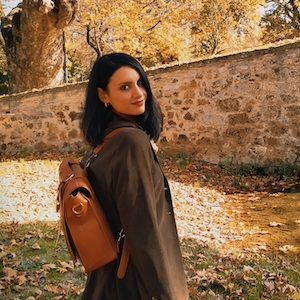
2019 was the year I hit rock bottom as the symptoms of my anxiety disorder worsened. Seeking some beam of light in the darkness, I started learning Japanese thanks to my enthusiasm for the country’s traditional and modern culture, especially Osamu Dazai’s fiction. By June of 2019, while binge reading some of Kazantzakis’ works — Kazantzakis being one of my favorite Greek authors — I also discovered a series of Kazantzakis’ travel books, which begin in Japan and China. These overlapping coincidences defined that year for me. The 'Nea Paralia' is a district alongside Thermaikos Bay, right at the heart of the city center of Thessaloniki, my hometown.
Vasilis Fragios, “Gentleman Reading a Newspaper”
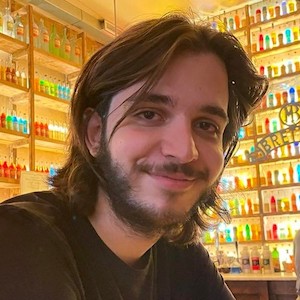
The idea for this poem came to me during a visit at the Greek National Gallery where this painting hangs. I had an instant reaction to the idea of a 19th C bourgeois man having his image immortalized in such a romanticized way, especially since we didn’t even know his name. What made him deserve such a gloriously intricate portrait, given that anonymity? As I began to poke fun at this mode of portraiture, I realized it wasn’t just that he was immortalized, but he was trapped there as well. He can never escape the painting, his class, the “bourgeois” label, or those viewers in the future who will criticize him and brush his portrait off as 'minor art.' I hope I managed to liberate him somewhat, while also expressing my conflicted feelings about him and about bourgeois portraiture – a genre that can appear glorious on the outside, but is often rotten on the inside.
Anastasia-Angeliki Karypidou, “Spinalonga: A Postcard”
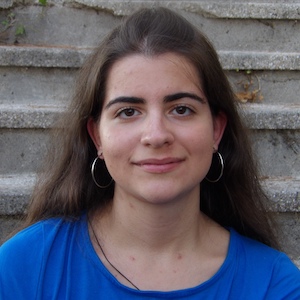
“Spinalonga: A Postcard” was inspired by my experiences since the outbreak of the COVID-19 pandemic. Spinalonga was the most accurate locale I could think of in order to communicate the state of my emotional and psychological life during the lockdown. Additionally, these parallels offered me a unique opportunity to explore similarities with the fears and anxieties caused by an earlier disease. The history of the 'island of the living dead' echoes the trauma of leprosy that haunted the Greek consciousness for years, while also evoking more recent trauma provoked by the ‘Spinalongas’ of the Present.
Anthony Kitsios, “Male Model Resting”
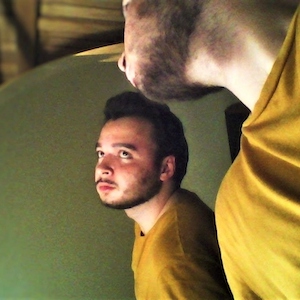
My poem 'Male Model Resting' was written in response to a painting of the same name produced by the Italian-born American painter John Singer Sargent. The Ancient Greco-Roman celebration of nudity, which the painting seems to echo, is underscored by my poem’s homoerotic inquiry, not to mention the painter’s tender brushstrokes. I wanted to consider the portrait both as an object in transition and as a subject gazed at (i.e., by the male gaze), while also bringing aspects of my own native language (Greek) and culture into play, thereby offering my own queer interpretation of the historical past and of this painting in particular.
Charitini Lekou, “Postcard Written on my Windowsill at 1:37am, Thessaloniki”
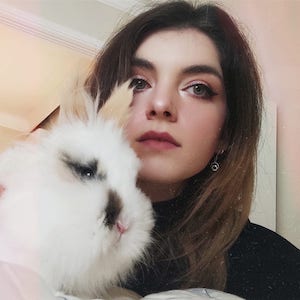
'Postcard Written on my Windowsill at 1:37am, Thessaloniki' is an epistolary poem about letting go. It was inspired by an awkward encounter with a person who used to be my close friend, which prompted the poem’s unpacking of shared memories and bonding moments. Written from the vantage point of the fifth stage of loss, and from a very specific location, it serves as a reminder that it is best to be content with missing what is gone.
Lydia Makri, “November Dusk from my Rooftop in Xanthi, Greece”
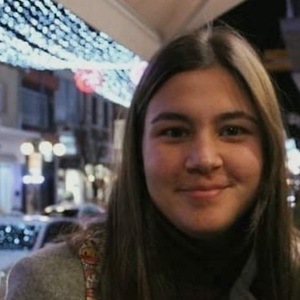
This poem aims to describe a complicated locale, one that happens to be in my hometown of Xanthi, where I spent eighteen years, plus a long extra year during the pandemic. I obviously feel a strong attachment to this place, but as I began trying to demonstrate that attachment, I also found myself unable to withhold certain defects, since not including those would have made these depictions feel untrue.
Artemis Maragkoudaki, “Self-Portrait in 2012”
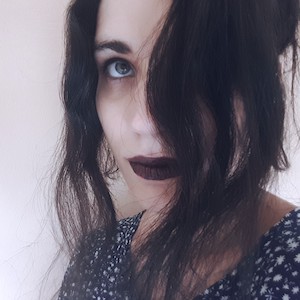
I wrote this poem while considering how a fairytale simplicity often contrasts with the grim undercurrents of one’s psychological reality. This is a poem about both self and other, since part of its aim is to praise the American poet Anne Sexton. I have always found myself being drawn to paradox in poetry, and the interplay between darkness and light. The poem offers a fusion of symbols that function as both parallel forces and juxtaposing pairs, and the poem’s purpose is to confess. Thematically, the poem’s components perform an homage to Anne Sexton, while at the same time attempting to portray a self I once was.
Penny Menekou, “A Greek Coffee”
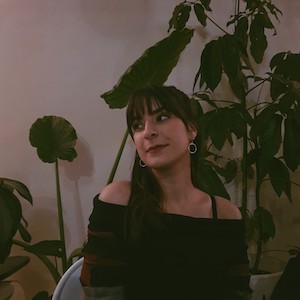
This poem aims to describe a traditional Greek coffee while also reflecting its cultural significance. Of course, the drink is not inherently Greek, since it originated from the depths of the East, and only through the centuries made its way to Greece. During 1923, Greek Orthodox Christians residing in Asia Minor, Eastern Thrace, Pontus and Caucasus, and also the Muslims of Greece, had to leave their homelands by force. Through this exchange, many Turkish and Greek customs migrated and were exchanged as well, including my favorite drink, what is now called a Greek Coffee.
Maria Petasi, “July 20th in Kato Chorio, Crete”
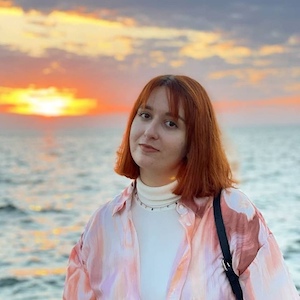
‘July 20th in Kato Chorio, Crete’ is a poem about return. More specifically, it is a poem about returning to one’s roots and coming to terms with the surprising estrangement that accompanies this experience. Set in a village at the furthest part of southeastern Crete, the poem juxtaposes the nostalgia of long-gone childhood summers with the emerging memories of the visitor who proves to have become nothing more than a stranger on otherwise familiar grounds.
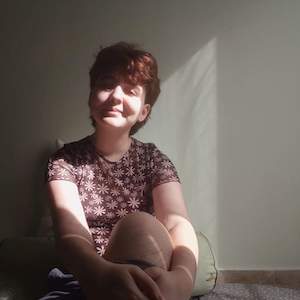
About “The Body”: I often use the language of possession to describe my own body. I say I have a body, that it belongs to me, that it is my own. This naturally comes as a reaction to the forces that have taught me how my misogyny-impacted flesh is not mine to own. But it is nevertheless a distant perspective; my consciousness is visualized as separate and this results in a type of competition over ownership. The body, despite all evidence to the contrary, becomes but an object, and that is where the poem begins.
About “In Which Achilles Is a God and a Cannibal”: Growing up as a young queer transmasculine person in the Greek education system, there were a lot of aspects of history I was not taught. When I did discover the queer aspects of ancient Greece, I devoured them with the aim of discovering myself. What I now know is that male homosexual desire cannot be easily separated from our most violent impulses, at least not in the stories we tell. Achilles and Patroclus were two boys in love. My apologies if that is not as pure as it may sound.
